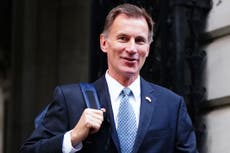Number of Britons on poverty pay set to hit 5.1 million next year
Exclusive: Another 1.6 million people will be pulled below real living wage rates, research shows

The number of Britons earning less than the real living wage is set to soar to 5.1 million next year, new research shared with The Independent has found.
Around 3.5 million workers currently earn less than the real living wage – the sum paid voluntarily by thousands of UK employers based on what people need to afford basic living costs.
But the Living Wage Foundation has forecast that another 1.6 million people will be pulled into poverty pay rates by the spring of 2023 because wages cannot keep pace with soaring inflation.
It means 5.1 million workers – one in five of all UK jobs – will be earning less than what they need to live on, the foundation said.
Katherine Chapman, director of the Living Wage Foundation, said: “Our forecasts demonstrate a bleak picture for next year, with an estimated 5.1 million workers set to be paid below the real living wage.”
She added: “With the cost of living rising and families facing more pressure this winter, it has never been more important for businesses to do the right thing and commit to paying a real living wage.”
The real living wage – slightly higher than the government’s statutory minimum wage and paid voluntarily by more 11,000 employers – stands at £11.95 in London and £10.90 across the rest of the UK
This voluntary rate was increased 10.1 per cent in September, roughly in line with inflation, in recognition of the sharp increase in living costs over the past year.
But the Living Wage Foundation said the ongoing inflation problem meant that by April, around 1.6 million workers would have been pulled into poverty pay rates – below what they need to pay their bills.
Employees must pay national minimum wage rates of between £4.81 and £9.18 from school leaving age until the age of 23, while workers who are 23 or older must get paid a minimum wage of £9.50 an hour – rebranded by the government as the “national living wage” in 2016.
However, the real living wage is set independently. “The real living wage must continue to be at the heart of solutions to tackle the cost of living crisis,” said Ms Chapman.
It comes as the TUC and union leaders warned Rishi Sunak and his chancellor Jeremy Hunt to protect public sector pay ahead of next week’s autumn budget.
The PCS union – announcing strike action earlier this week for more than 100,000 government – said many low-paid staff in Whitehall and public bodies across the UK were forced to turn to food banks.
Food banks had been set up at the Department for Business Energy and Industrial Strategy (BEIS) and other major government offices, said PCS boss Mark Serwotka.
“Poverty is everywhere in the civil service. Food banks for civil servants tell us that pay is chronically low and urgent intervention by government is needed,” he said.
Join our commenting forum
Join thought-provoking conversations, follow other Independent readers and see their replies
Comments



Bookmark popover
Removed from bookmarks